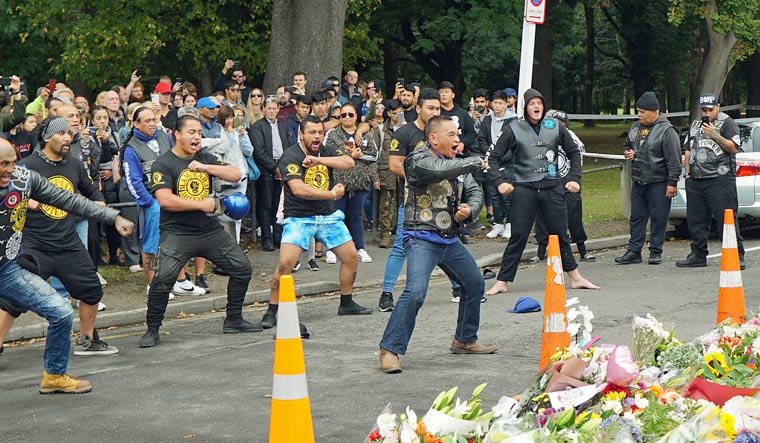Haka, a commemorative dance, the origins of which lie with the indigenous Maori tribe, is being performed by New Zealanders for victims of the Christchurch shooting. The war dance is done at funerals, weddings to celebrate, mourn or just mark the occassion.
New Zealanders are gathering to thump chests, stomp feet and stick out their tongues — staging impromptu performances of the haka war dance to show solidarity with a Muslim community shattered by the mass shooting in Christchurch. Everyone right from bikers and businessmen to children, students and the elderly are performing the dance that begins with chants roughly translated as "I Live! I Die!"
As the country struggles to respond to the horrific tragedy, it was perhaps inevitable that many would turn to the haka — a dance whose origins lie with the indigenous Maori community but which has become a global symbol of New Zealand as the battle cry of its national rugby team, the All Blacks.
also read
- Bourbon Street New Orleans attack suspect's identity: He lived in St Roch neighbourhood rental house, says report
- Good cops of New Orleans 'who went flying on foot' to Bourbon Street win internet's respect | WATCH VIRAL VIDEO HERE
- New Orleans Bourbon Street shooter dead: FBI yet to explain 'improvised explosive device at the scene', 'not terrorist' angle
Videos of the haka trubutes were shared widely on social media.
The aggressive ritual and threatening histrionics may seem out of step with the sombre atmosphere gripping the nation after Brenton Tarrant, a 28-year-old Australian and avowed white supremacist, allegedly gunned down 50 Muslims during prayers last Friday.
But the haka is not only meant to intimidate, but also to mourn, melding both hostility and beauty into an outpouring of true emotion, said Te Kahautu Maxwell, a professor of Maori at Waikato University.
"Haka is used for death and mourning. It is an integral part of the Maori mourning process. Haka is used to show love and compassion. Haka is used to uplift the spirits of bereaved families," Maxwell said.
The haka tributes have been storring emotions in survivors as well as families of victims of the shooting.
Kawthar Abulaban, who was at Christchurch's Al Noor mosque when the shooting erupted, eventually escaped through the back door.
In the days since, she has repeatedly watched videos of the haka performances staged in response to the massacre, welling up each time.
"Because you can feel it when you see them. You feel it, it touches your heart. Every time I see it I cry, it means too much," she said.
According to Maori legend, the haka originated at the beginning of time as a gift from Tanerore, the son of Tama-nuira, the sun god.
"Just as heat haze shimmers on a hot summer's day, in the haka all parts of the body shake from the crown to the soles of one's feet," Maxwell said, describing the intended meaning behind the dance's movements.
Lisa Tumahai, who heads the Ngai Tahu, the main Maori iwi, or tribe, on New Zealand's South Island, said it was a natural reaction by Kiwis looking to show support for their Muslim neighbours.
In a further show of solidarity, the New Zealand government invited a Muslim imam to intone the Koranic bismillah in praise of Allah at the opening of the parliamentary session on Tuesday.
New Zealand Prime Minister Jacinda Ardern followed up by saying "Wa alaikum salaam wa rahmatullahi wa barakatuh" — "May the peace, mercy, and blessings of Allah be with you too."


